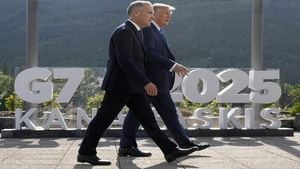Guatemala took a historic step on Tuesday, October 21, 2025, passing a sweeping new anti-gang law that declares the notorious Barrio 18 and Mara Salvatrucha gangs as terrorist organizations. The legislation, which had languished in political limbo for years, suddenly gained urgency and momentum after the dramatic prison escape of 20 Barrio 18 members earlier this month. That high-profile security breach not only shook public confidence but also led to the resignations of three top security officials, underscoring the mounting pressure on President Bernardo Arévalo’s administration to curb gang violence and restore order.
The new law, reported by the Associated Press and confirmed by multiple outlets on October 22, 2025, equips the Guatemalan government with expanded resources and legal authority to confront criminal groups that have long terrorized communities. By officially designating Barrio 18 and Mara Salvatrucha as terrorist groups, the legislation paves the way for stiffer penalties, enhanced law enforcement powers, and the construction of a new, specialized prison to house convicted gang members. It’s a bold move—one that signals a dramatic escalation in the country’s fight against organized crime.
The backdrop to this legislative breakthrough is as tense as it is compelling. Earlier in October, 20 members of Barrio 18 staged a coordinated escape from a Guatemalan prison—a feat that exposed glaring weaknesses in the country’s penal system. According to the Associated Press, President Arévalo described the escape as a "coordinated plot by the gang, which was frustrated by steps his then-Interior Minister Francisco Jiménez was taking to toughen conditions for them in prison." The incident not only embarrassed authorities but also forced the president’s hand, resulting in the resignation of three high-ranking security officials in the week preceding the law’s passage.
Guatemala’s new anti-gang law is sweeping in its scope. Not only does it increase prison sentences for gang members convicted of crimes, but it also mandates the construction of a new prison specifically for gang-affiliated inmates. The rationale is clear: traditional prisons have proven vulnerable to infiltration, corruption, and, as recent events have shown, spectacular escapes. By isolating gang members in a dedicated facility, the government hopes to disrupt their ability to coordinate criminal activity from behind bars—a persistent problem in Guatemala and much of Central America.
The law’s passage comes on the heels of significant international developments. In September 2025, the Trump administration in the United States designated Barrio 18 as a foreign terrorist organization, a status that Mara Salvatrucha (also known as MS-13) had already attained. This move by Washington reflected growing alarm over the transnational reach and brutality of these gangs, whose operations extend well beyond Guatemala’s borders. The U.S. designation not only increases pressure on the Guatemalan government to act but also opens the door to expanded international cooperation and support.
But the Guatemalan government is not operating in a vacuum. Just across the border, El Salvador has waged a relentless and controversial campaign against the same gangs, declaring a state of emergency that has now lasted more than three years. According to the Associated Press, El Salvador’s approach has been both lauded and criticized: by suspending some fundamental rights and incarcerating over 80,000 people, President Nayib Bukele’s administration has dramatically reduced gang violence, but at the cost of civil liberties and due process. The security success in El Salvador has not gone unnoticed. Leaders across the region, including those in Guatemala, are feeling the heat from constituents demanding similar results, even as human rights advocates warn of the dangers of unchecked state power.
As Guatemala moves forward with its new law, the government faces a delicate balancing act. On one hand, there is palpable public demand for decisive action against gangs that have sown chaos for decades. On the other, there are legitimate fears about the potential erosion of civil liberties and the risk of wrongful imprisonment. The example of El Salvador looms large: its security crackdown has all but decimated the gangs, but critics argue that the price has been too high, with thousands reportedly detained without trial and reports of abuses surfacing regularly.
For President Arévalo, the stakes could hardly be higher. The recent escape of Barrio 18 members was a stark reminder of the resilience and cunning of Guatemala’s criminal organizations. It also demonstrated the limitations of existing security measures and the urgent need for reform. By pushing through the anti-gang law, Arévalo is betting that tougher penalties, targeted incarceration, and the terrorist designation will shift the balance of power back toward the state. As he stated before the law’s passage, the escape was not a random act, but a calculated response to his administration’s efforts to “toughen conditions for them in prison.” The message is clear: the government will not back down in the face of intimidation.
Still, the road ahead is fraught with challenges. The construction of a new prison for gang members will take time and resources, and there are questions about whether it will be enough to stem the tide of violence. The increased sentences and terrorist designation may deter some would-be criminals, but could also push gangs further underground or provoke retaliatory attacks. And while international support is likely to grow in the wake of the U.S. terrorist designation, there is always the risk that heavy-handed tactics could backfire, fueling further instability or drawing criticism from human rights organizations.
Meanwhile, Guatemalan police continue their efforts to recapture the remaining escaped gang members. On the same day the law passed, authorities announced the recapture of a fourth escapee—a small but symbolic victory in the ongoing struggle. For many in Guatemala, the hope is that the new law will mark a turning point, ushering in a period of greater security and accountability. For others, especially those wary of potential abuses, the legislation is a reminder that the fight against crime must not come at the expense of justice and human rights.
The story of Guatemala’s anti-gang law is, in many ways, a microcosm of the broader struggle facing much of Central America: how to confront entrenched criminal networks without undermining the very democratic institutions and freedoms that societies seek to protect. As the dust settles on this latest legislative battle, all eyes will be on Guatemala to see whether its gamble pays off—and whether the country can chart a course that is both tough on crime and true to its democratic ideals.





